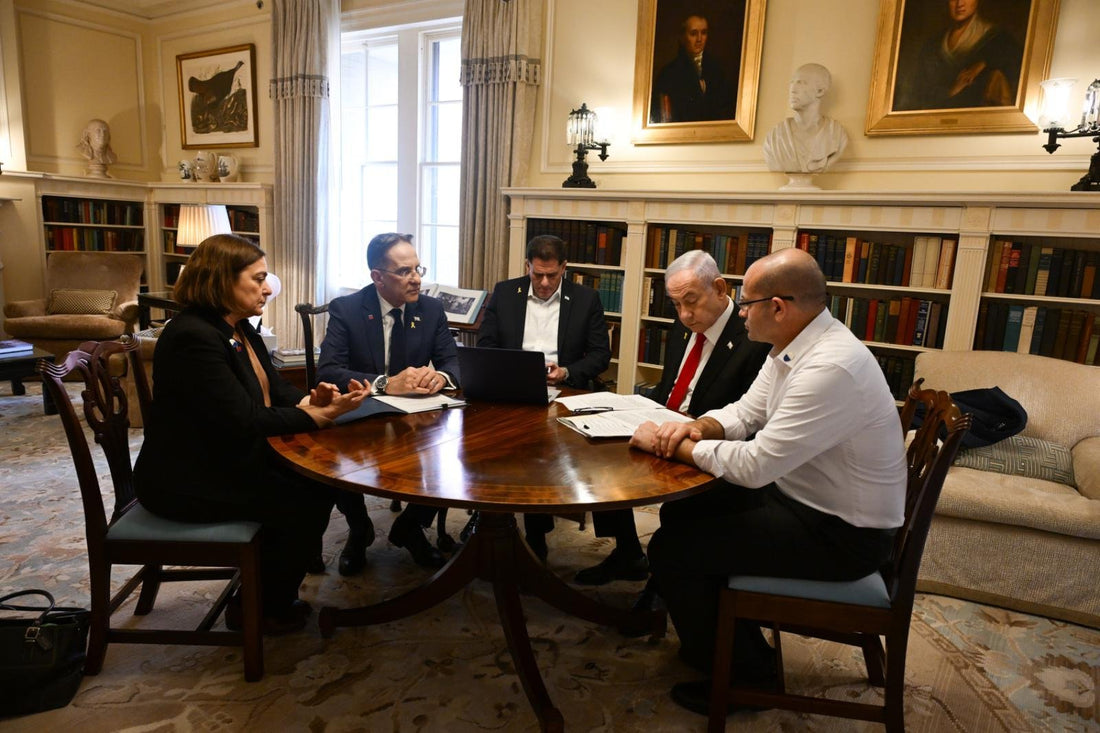Netanyahu Meets Vance Amidst Tensions, Seeks US Support
Omar HassanNetanyahu met Vance in Washington to seek US support amid regional tensions and discuss ceasefire possibilities.

Israeli Prime Minister Benjamin Netanyahu met with U. S. Vice President J. D. Vance in Washington D. C., continuing his diplomatic efforts to solidify U. S. support for Israel amidst regional tensions. The meeting, held at Blair House, precedes Netanyahu's scheduled discussions with key congressional leaders.
These talks are crucial as Netanyahu seeks to navigate a complex political landscape and address concerns about regional stability. Netanyahu's visit underscores the strategic importance of the U.S.-Israel alliance, particularly as discussions around a ceasefire with Hamas and negotiations with Iran intensify. The Prime Minister aims to reassure U.S. leaders of Israel's commitment to peace and security, while also seeking backing for its stance on regional challenges.
His discussions in Washington are pivotal for shaping the future trajectory of U. S.-Israel relations and addressing pressing issues in the Middle East.
Highlights
- Netanyahu met with US Vice President J. D. Vance in Washington to discuss regional security.
- The Israeli Prime Minister is seeking to reinforce U. S. support amidst ongoing tensions.
- Discussions included the potential for a ceasefire with Hamas and negotiations with Iran.
Read More: Xbox to be like Office: Everywhere, says Nadella
Top 5 Key Insights
• Strategic Alliance: The meeting highlights the enduring strategic alliance between the United States and Israel. This partnership is crucial for addressing regional security challenges and promoting stability in the Middle East.
• Ceasefire Negotiations: Discussions around a potential ceasefire with Hamas are central to the talks. Achieving a lasting ceasefire is a key priority for both Israel and the United States.
• Regional Security: Netanyahu is seeking U. S. support for Israel's security concerns amidst rising tensions. This includes addressing threats posed by Iran and other regional actors.
• Congressional Support: Meetings with House Speaker Mike Johnson and other congressional leaders are vital. Gaining bipartisan support in Congress is essential for advancing Israel's interests and maintaining a strong U. S.-Israel relationship.
• Future Cooperation: The visit aims to strengthen future cooperation between the two countries. This includes collaboration on defense, intelligence sharing, and diplomatic initiatives.
Read More: Jessica Alba's Net Worth: Acting, Business & Real Estate
Expert Insights
CBS News: "Congressional leaders are meeting Tuesday with Prime Minister Benjamin Netanyahu after some lawmakers accused the Israeli leader of trying to drag the U. S. into another war."
Read More: AI Search Engines Favor Less Popular Sources: Study
Wrap Up
Netanyahu's visit to Washington signals a critical moment for U. S.-Israel relations, as both nations navigate complex regional challenges.
The discussions with Vice President Vance and congressional leaders reflect a concerted effort to align strategies and reinforce their shared commitment to security and stability. The outcomes of these meetings could significantly influence the trajectory of Middle Eastern politics and the future of the U.
S.-Israel alliance. The pursuit of peace and the management of regional tensions remain central to this ongoing partnership..
Read More: Trump's $80B Nuclear Reactor Plan Fuels AI Ambitions
Author
Omar Hassan - An experienced international affairs correspondent with a global perspective on major world events and diplomacy. He brings insightful commentary on global trends and international relations to Enlightnr.
More to Explore
- Choosing a selection results in a full page refresh.
- Opens in a new window.




